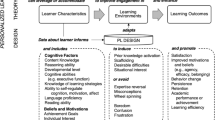Abstract
Part of the vision of school reform is to reconstruct schools as “learning communities” in which students and teachers pursue topics of interest. Computers can provide powerful tools for students in learning communities where inquiry, data gathering, interpretation, thinking, and judgment take place. Changing beliefs in educational goals and great support for teachers will be necessary if we are to realize the potential of computers in restructured classrooms. The greatest possibilities exist in new “Professional Development Schools,” where university faculty join school teachers in joint efforts to restructure learning environments. New evaluation procedures are also needed if competencies associated with information retrieval and use are to be assessed.
Similar content being viewed by others
References
Boyer, E. L. (1986). Education's new challenge. In T. R. Cannings & S. W. Brown (Eds.),The information age classroom: Using the computer as a tool. Irvine, CA: Franklin, Beedle & Associates.
Chang, C. K. (1991).The effects of cognitive complexity, need for cognition and orientation toward learning on information search strategies. Unpublished doctoral dissertation, Purdue University, Lafayette, IN.
Crane, G. (1990). Challenging the individual: The tradition of hypermedia databases.Academic Computing, 4(4), 22–23, 31–38.
Eisenschiml, O., & Newman, R. (1947).The American Iliad. Indianapolis: Bobbs-Merrill.
Featherstone, J. (1990, Fall). Quoted in K. Devaney (Ed.),The Holmes Group Forum, 5(1), p.15.
Gabel, P. (1989).The Vietnam War: A hypercard history book. Scotts Valley, CA: Paul Gabel Regeneration Software.
Holmes Group (1990).Tomorrow's schools. East Lansing, MI: Author.
Laughon, S., & Kulikowski, S. (1991, October 30). ForProceedings of 9th ICTE, March 92. (Computer communication posted to and archived on the listserv EDTECH@OHSTVMA.)
Levin, J. A., Riel, M., Myiyake, N., & Cohen, M. (1987). Education on the electronic frontier: Teleapprentices in globally distributed educational contexts.Contemporary Educational Psychology, 12(3), 254–260.
McDaniel, E., & Lohmann, J. (1988, June).An instructional model to enhance thinking. Paper presented at the Fourth National Conference on Thinking, Cincinnati, Ohio.
Riel, M. (1985). The computer chronicles newswire: A functional learning environment for acquiring literacy skills.Journal of Educational Computing Research, 1(3), 317–337.
Shulman, L. S. (1986). Paradigms and research programs in the study of teaching: A contemporary perspective. In M. Wittrock (Ed.),Handbook of research on teaching. New York: Macmillan.
Suchman, J. R. (1966). A model for the analysis of inquiry. In H. J. Klausmeier & C. W. Harris (Eds.),Analyses of concept learning. New York: Academic Press.
Taba, H. (1966).Thinking strategies and cognitive functioning in elementary school children (USOE Cooperative Research Project No. 2404). San Francisco: San Francisco State College.
Thelen, H. (1972).Education and the human quest. Chicago: University of Chicago Press.
Walker, D. F. (1986). Reflections on the educational potential and limitations of microcomputers. In T. R. Cannings & S. W. Brown (Eds.),The information age classroom: Using the computer as a tool. Irvine, CA: Franklin, Beedle & Associates.
Author information
Authors and Affiliations
Rights and permissions
About this article
Cite this article
McDaniel, E., McInerney, W. & Armstrong, P. Computers and school reform. ETR&D 41, 73–78 (1993). https://doi.org/10.1007/BF02297093
Issue Date:
DOI: https://doi.org/10.1007/BF02297093




